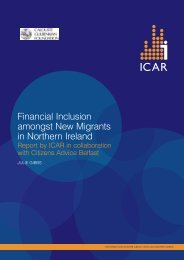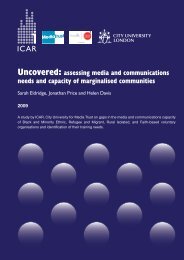Navigation guide Refugee populations in the UK: Algerians - ICAR
Navigation guide Refugee populations in the UK: Algerians - ICAR
Navigation guide Refugee populations in the UK: Algerians - ICAR
You also want an ePaper? Increase the reach of your titles
YUMPU automatically turns print PDFs into web optimized ePapers that Google loves.
Ethnic background<br />
• <strong>Algerians</strong> are ma<strong>in</strong>ly Arabs but <strong>the</strong>re is a significant Berber presence (approximately 10% of <strong>the</strong><br />
population <strong>in</strong> Algeria). Although Berbers fall <strong>in</strong>to a number of dist<strong>in</strong>ct sub-groups (<strong>the</strong> four most<br />
significant are Kabyle, Choauia, Toureg and Mozabite), <strong>the</strong>y are typically categorised as a s<strong>in</strong>gle<br />
ethnic m<strong>in</strong>ority <strong>in</strong> Algeria.<br />
• Berbers, particularly Kabyles, are over represented with<strong>in</strong> <strong>the</strong> Algerian community <strong>in</strong> France<br />
(approximately 20% of <strong>Algerians</strong> <strong>in</strong> France are of Berber orig<strong>in</strong>).<br />
• There is also a significant Berber presence <strong>in</strong> <strong>the</strong> <strong>UK</strong>, though <strong>the</strong> exact proportion is unknown.<br />
o The Member of <strong>the</strong> Algerian National Assembly represent<strong>in</strong>g emigrants <strong>in</strong> Nor<strong>the</strong>rn<br />
Europe elected <strong>in</strong> 1997 is a member of <strong>the</strong> RCD (Rassemblement pour la Culture et la<br />
Democratie), a party with a strong Berber constituency.<br />
o There was a small but significant protest <strong>in</strong> Trafalgar Square, London, aga<strong>in</strong>st <strong>the</strong><br />
violence of <strong>the</strong> police <strong>in</strong> <strong>the</strong> Berber region of Kabylia <strong>in</strong> 2001.<br />
o However, no services reported receiv<strong>in</strong>g a large number of Berber clients and <strong>the</strong>y are<br />
likely to rema<strong>in</strong> a m<strong>in</strong>ority 44 with<strong>in</strong> <strong>the</strong> wider Algerian population.<br />
Languages spoken<br />
• The nationally recognised languages <strong>in</strong> Algeria are Arabic and, s<strong>in</strong>ce 2002, <strong>the</strong> Berber language<br />
Tamaziyt; which of <strong>the</strong>m is spoken will depend on ethnic background. The Arabic spoken is an<br />
Algerian dialect that is different from standard Arabic.<br />
• Any Algerian educated to secondary level will also speak some French.<br />
• English is grow<strong>in</strong>g <strong>in</strong> popularity and becom<strong>in</strong>g more widely spoken, especially among those educated<br />
to a higher level.<br />
Religion<br />
• Islam is one of <strong>the</strong> found<strong>in</strong>g pr<strong>in</strong>ciples of <strong>the</strong> Algerian state and <strong>the</strong> official religion of Algeria. The<br />
majority of <strong>Algerians</strong> are Sunnis and <strong>the</strong> Malki judicial school is <strong>the</strong> most common. South Asian<br />
Muslims, <strong>the</strong> most significant Muslim group <strong>in</strong> Brita<strong>in</strong>, are Sunni and typically from <strong>the</strong> Hanafi judicial<br />
school, which is considered by Malkis to be far less conservative. There is no barrier between judicial<br />
schools and <strong>Algerians</strong> worship <strong>in</strong> a whole range of mosques <strong>in</strong> <strong>the</strong> <strong>UK</strong>.<br />
• Though Algeria is far from be<strong>in</strong>g an Islamic state, as Islamic law (shari’a) is not <strong>in</strong> force, <strong>the</strong>re is a<br />
strong Islamic <strong>in</strong>fluence on private or family law. The Code de la Famille (Family Code), <strong>in</strong>troduced <strong>in</strong><br />
1984 and still <strong>in</strong> force, clearly relates to shari’a and is strongly opposed by fem<strong>in</strong>ist groups.<br />
• Many Algerian Islamist groups and political parties draw <strong>the</strong>ir <strong>in</strong>fluence most strongly from groups<br />
such as <strong>the</strong> Muslim Bro<strong>the</strong>rhood, founded <strong>in</strong> Egypt <strong>in</strong> 1928.<br />
Age<br />
• A wide diversity of ages is represented, though <strong>the</strong>re are many more young people.<br />
• Those who have arrived s<strong>in</strong>ce 1992 are much younger. This is unsurpris<strong>in</strong>g s<strong>in</strong>ce 75% of <strong>the</strong> Algerian<br />
population is now under <strong>the</strong> age of 30.<br />
44 Collyer, M. (2002) ‘Expla<strong>in</strong><strong>in</strong>g change <strong>in</strong> established migration systems: <strong>the</strong> movement of <strong>Algerians</strong> to France and<br />
<strong>the</strong> <strong>UK</strong>’ University of Sussex, DPhil <strong>the</strong>sis, bound and recorded at <strong>the</strong> British Library.<br />
<strong>Navigation</strong> <strong>guide</strong> to refugee <strong>populations</strong>: <strong>Algerians</strong><br />
©<strong>ICAR</strong> 2004, moral rights Michael Collyer<br />
18

















